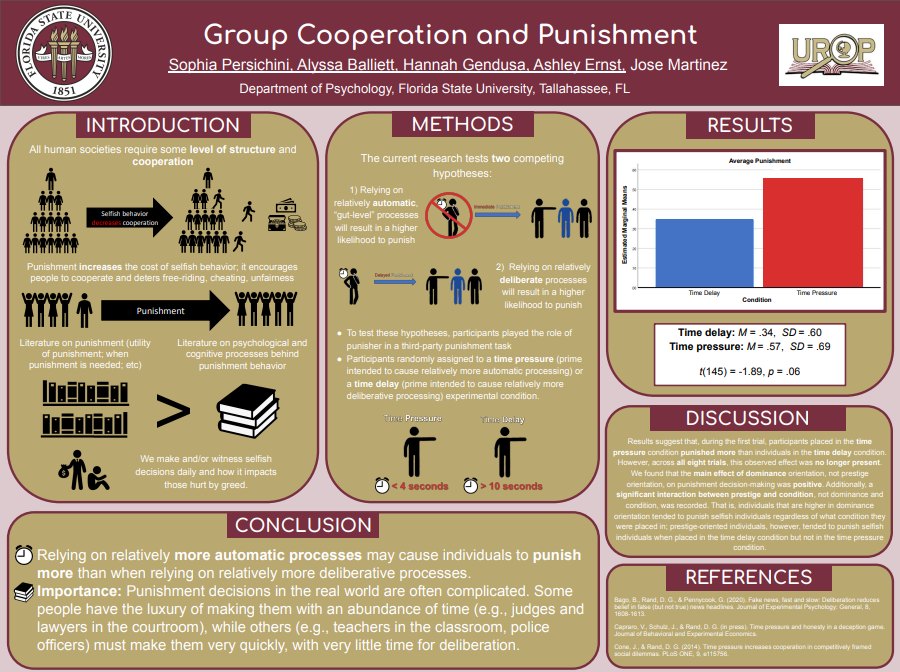Research Symposium
23rd annual Undergraduate Research Symposium, April 6, 2023
Hannah Gendusa Poster Session 3: 2:45 pm - 3:45 pm/ Poster #52

BIO
Hannah just completed her sophomore year in the Honors College program at FSU and will be a rising junior in the fall. While participating in UROP, she joined José's team to test two competing hypotheses about the psychological processes driving punishment behavior. Post-UROP, Hannah plans on continuing her research journey with José to ultimately apply the psychology principles she learns through his research to her dream career as a critical care physician’s assistant. Along with completing prerequisites for her Biology degree and the PA master’s program, you will find Hannah volunteering with FSU’s Medical Response Unit or re-watching Criminal Minds for the fifteenth time.
Group Cooperation and Punishment
Authors: Hannah Gendusa, José MartinezStudent Major: Biological Sciences
Mentor: José Martinez
Mentor's Department: Psychology Department Mentor's College: College of Arts and Sciences Co-Presenters: Alyssa Balliett, Ashley Ernst, Sophia Persichini
Abstract
Punishment is useful for increasing group cooperation and reducing selfish behavior. However, many questions remain regarding the psychological and cognitive processes that drive punishing behavior. The current research tests two competing hypotheses regarding the processes behind punishment: (1) punishment relies on relatively automatic processes (2) punishment relies on relatively deliberate processes. To test these hypotheses, participants played the role of “punisher” and were placed in either a time pressure (prime intended to cause relatively automatic processing) or a time delay (prime intended to cause relatively deliberative processing) experimental condition. Results suggest that, during the first trial, participants in the time pressure condition punished more than individuals in the time delay condition. However, across all eight trials, this observed effect was no longer present. Secondary analyse examined the potentially moderating roles of individual differences in dominance and prestige. We found that the main effect of dominance orientation, not prestige orientation, on punishment decision-making was positive. Additionally, a significant interaction between prestige and condition, not dominance and condition, was recorded. These findings suggest that, when individuals are provided time to deliberate, the decision to punish may not be chosen, allowing the uncooperative behavior exhibited by a selfish individual to go unaddressed. While dominance-orientated individuals appear to punish a selfish individual regardless of the time allotted, prestige-orientated individuals may only make such a decision after deliberation. While punishment can be a costly behavior, it is a necessary decision as there may be circumstances that disincentivize individuals from punishment decision-making that must be addressed.
Keywords: Psychology, Cooperation, Punishment, Decision-Making

